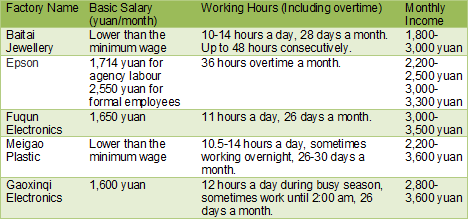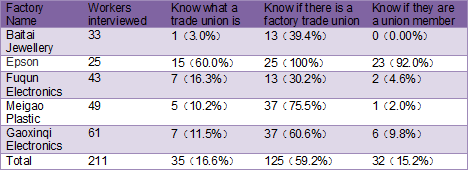In May 2012, the Shenzhen Federation of Trade Unions launched a high profile campaign to hold direct elections in 163 enterprise trade unions in the city by the end of the year.
In the summer of 2013, a group of students from nine universities went undercover to assess the actual state of enterprise trade union reform in the city. They investigated five factories and found the trade unions there to be of little or no use in protecting workers rights.
The students sent their findings to the Shenzhen Federation of Trade Unions on 26 October 2013 and called for a face-to-face meeting to discuss the failings outlined in the report.
The 12 investigative students posed as job-seekers and managed to find work at five Shenzhen factories that were supposed to have good trade unions. Three of the five unions had in fact received national awards for their work, including one lauded as a star of the 2012 democratic trade union election movement.
The investigation found that the trade unions in these factories played no effective role in representing the workers or in upholding their rights. Violations of workers’ rights, such as excessive working hours, basic pay lower than the municipal minimum wage of 1,600 yuan per month, poor working conditions and insufficient protective gear, were discovered at many of the five factories. The only factory that had reasonable pay and working conditions, as well as a high union recognition, was the Japanese-owned Epson factory.

In all, the students interviewed 211 workers and found that while 59 percent of them knew there was a trade union at their factory, only 17 percent knew what a trade union actually was, and 15 percent knew if they were a member of that union or not. At the Baitai jewellery factory, for example, none of the 33 interviewees knew if they were a member of the union.

There were no democratic union elections in the five factories. The report revealed that none of the workers representatives or union chairs at these factories had been elected from the rank and file of ordinary workers. In most cases, the factory simply assigned senior management staff to these positions. The report also revealed that factories sometimes forced workers to provide false statements to the municipal trade union when it investigated.

China Labour Bulletin Deputy Director Cai Chongguo suggested that a deeper engagement with civil society and the use of social media could help counter attempts by management to control and manipulate the trade union:
To prevent the company from manipulating the election process, the trade union should, prior to the election, work with non-governmental labour organizations to provide training sessions on election organizing, union operations and collective bargaining. During the election, civil society organizations, journalists, and local trade union officials should be present, and workers could also broadcast the election process live on social media.
The Hong Kong pressure group Students and Scholars Against Corporate Misbehaviour (SACOM) has now translated the report in English, available as a PDF. Power to the Workers - Envisioning the Progress and Limitations of the Direct Elections of Shenzhen Enterprise Trade Unions by College Students from Nine Universities.
